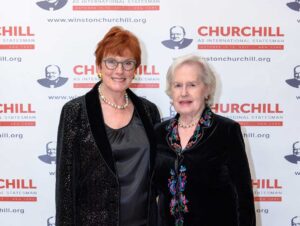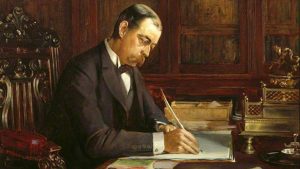Finest Hour 163
History Detectives – If You Don’t Find Baseball, Baseball Will Find You – Eminent Churchillians on and off the Ball Field

Winston Churchill, Parliament Square, London © Sue Lowry & Magellan PR
February 6, 2015
Finest Hour 163, Summer 2014
Page 40
By Christopher Schwarz
It’s baseball season in America, but you will be wondering what it has to do with Sir Winston. Well, enough for this Churchillian fan of the “National Pastime” (which has been sadly eclipsed nowadays by football—just another of those team games played against a clock).
How is it that the son of Jennie Jerome, a woman born in Brooklyn, at the epicenter of early professional baseball, just three miles from the future home of the fabled Brooklyn Dodgers, never attended a Major League baseball game? Despite Winston Churchill’s deep pride in his American roots, he never showed up at a ballpark during his sixteen trips to his mother’s land. The oft-quoted cultural historian Jacques Barzun would consider it a colossal missed opportunity. As he put it, “whoever wants to know the heart and mind of America had better learn baseball, the rules and reality of the game.”
Barzun’s advice doesn’t apply as much now as it once did, but during Churchill’s lifetime baseball was a crucial part of American culture. What might he have learned about America at the ballpark? He enjoyed writing and talking about “what if?” scenarios. Baseball is full of them. What if he saw a game? Would people have heard him bellowing “dog and a beer” to a roving vendor? Would his understanding of America have increased? Would he have enjoyed sitting in the open air, smoking a cigar—that sort of thing was allowed back then—amid the raucous, colorful crowd? But could a man famously averse to boredom sit through nine innings?
While Churchill was more sportsman than sports fan, I think he would would have appreciated the athletic skill and grace of the grand old game—its elegance and pace, its tenacious adherence to traditions. Described as “keenly watchful” and a “master in tactics and strategy,” he would likely have been impressed by the managers’ moves during a ball game.
Although some of Churchill’s visits didn’t coincide with the baseball season, several of his trips to New York or Washington might have allowed him to catch a game. (To get to Yankee Stadium, fans took the subway to Woodlawn and Jerome Avenues; Churchill would have noticed his maternal family’s name.) His good friend FDR enjoyed baseball immensely. Roosevelt, in fact, holds the record, constitutionally protected now, for most ceremonial first pitches tossed by the chief executive.
Consider what Churchill missed over the sixty-year span of his visits to America.
He first arrived in the United States in 1895, the same year a Churchill (his first name is lost to history) appeared in professional baseball, playing for the Port Huron Marines. A future First Lord of the Admiralty might have rooted for such a team.
Baseball is a game where we keep track of everything. We know, for example, of a minor league baseball manager named Neil Churchill, who happens to have done something extraordinary: he headed the first integrated professional baseball team twelve years before Jackie Robinson broke the major league color barrier.
And we know of fourteen players named Churchill, though none of them made the majors. One of these, Robert, was Churchillian in his efforts, never, never, never giving in as he toiled in the minor leagues for a dozen years, batting .239.
Perhaps Churchill’s 1900 visit with Mark Twain, a prominent baseball fan, would have gone better in the summer rather than the late autumn. Cigars in hand, they could have watched the Brooklyn Superbas—progenitors of the Dodgers—on their march to the National League championship.
Imagine Twain regaling young Winston with the mythical baseball game in his fantasy, A Connecticut Yankee in King Arthur’s Court, as they watched the Brooklyns win in “superb” fashion. And if Churchill had stuck around for the summer of 1901, he might have witnessed the debut of one of the best English-born players, Hobe Ferris of the Boston Americans. The pride of Trowbridge, Wiltshire, Ferris played nearly 1300 games over nine seasons.
Churchill, his brother and their sons traveled to North America in August 1929, passing through many minor league cities but but not arriving in Chicago, their first major league city, until October 2nd. Had they started in the south and east, they could have seen the Philadelphia Athletics and Chicago Cubs slug their way to respective pennants. Alas Cubs fans were disappointed (again), losing the World Series four games to one.
October did not go well for Churchill either: he lost £10,000 in the Stock Market Crash, a little over two weeks later. The need for money brought him back to the U.S. in 1931-32 on an ambitious speaking tour, most notable for his nearly being killed by a car in New York in December.
He wouldn’t return until December 1941. While he had graver matters on his mind the previous summer, he missed one of the truly glorious baseball seasons. While Operation Barbarossa and the see-saw North Africa battle between Rommel and the Desert Rats made the front pages, Joe DiMaggio and Ted Williams used all the ink on the sports pages for their respective 56-game hitting streak and assault on the elusive .400 batting average.
That summer was also notable for the death of a baseball player known for Churchillian resilience and a memorable speech, when Lou Gehrig, Pride of the Yankees, succumbed to amyotrophic lateral sclerosis. On subsequent wartime visits Churchill didn’t miss much, since thirty-two stars including Williams and DiMaggio left to serve in the military.
Churchill visited the United States four times in the Fifties and had four more opportunities to watch stellar baseball. New York was by far the best place to see a game: in that halcyon decade New York baseball teams would play in nine and win eight World Series, five of the encounters pitting New York clubs against each another. “The Boys of Summer,” Roger Kahn’s lyrical name for the Brooklyn Dodgers, who played in four, might have been familiar to Churchill from the poem of that same name by Dylan Thomas.
And here is another odd bit of trivia: On 2 October 2012, as the now-Los Angeles Dodgers were watching their play-off hopes fall to the now-San Francisco Giants, their immortal announcer Vin Scully (voice of the Dodgers since 1950) invoked a line from another Dylan Thomas poem: “Do not go gentle into that good night.”
Churchill’s 1954 visit was a near miss in both baseball and historic terms. Had he delayed his return from New York just a few days until after the Fourth of July, he could have gone to Yankee Stadium for a four-game series against the Washington Senators and met (the mind boggles!) another great wordsmith: Yogi Berra.
Ponder the lost opportunity: those two men are possibly the most quoted—or misquoted—figures in history. Yogi once explained, “I never said many of the things I said.” Churchill would commiserate.
Frail and in ill health, Sir Winston Churchill made his last journey to America with a brief stop in New York in the spring of 1961 at the very beginning of another auspicious baseball year. By season’s end, one of the sacred records would fall to Roger Maris as he passed Babe Ruth’s season record of sixty home runs. A little more than a week after Churchill left America for the final time, Maris clouted the first of his sixty-one homers.
While we can only speculate as to whether attending a ballgame would have deepened his understanding for the United States, it was best for all that Churchill spent his time in America on more serious matters. There wasn’t enough free time for this indispensable man. Baseball, in a way, also has means to measure indispensability. Known as Sabermetrics, it is the intricate statistical analysis of empirical data used to measure skill and overall talent, sophisticated math that might have tantalized Churchill’s scientific adviser, Lord Cherwell. Stats like the UZR (Ultimate Zone Rating) measure overall defensive prowess, a skill Churchill thrived at. Or, even more appropriately, the WAR stat (Wins above Replacement) measures the overall value of a player in terms of victories compared to a less able counterpart in the same position. It is amusing to consider what Churchill’s World War II WAR stat would be.
In more counterfactual terms, what would have happened if Chamberlain had remained prime minister in May 1940? It would have been a whole ’nother ballgame.
Mr. Schwarz, a high scool history teacher and baseball coach in Skokie, Illinois, designed the school’s semester-long course on World War II and attended the 2006 Churchill Institute at Ashland University. He is the author of “When the Twain Met: Winston Churchill and Samuel Clemens,” FH 149: 40-44.
Subscribe
WANT MORE?
Get the Churchill Bulletin delivered to your inbox once a month.





